

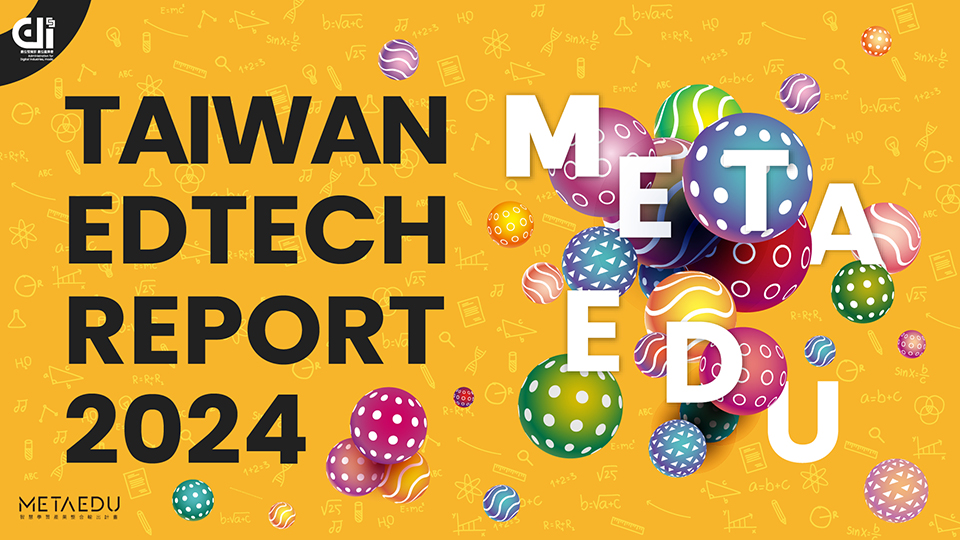

This report will cover the survey and research on the EdTech industry in 2024, as well as the 2024 Taiwan EdTech 50 selected by HolonIQ. According to the report, the total output value of Taiwan's EdTech industry in 2024 was TWD 206.93 billion, with instructional hardware accounting for about 64.7% (TWD 133.98 billion), the value of instructional content accounting for 16.9% (TWD 35.01 billion), and software systems accounting for 18.3% (TWD 37.94 billion).
The METAEDU Program continues to promote excellent products/solutions to the global education market, make good use of technology, solve digital gaps, and achieve the goal of educational equality.
The METAEDU Program continues to promote excellent products/solutions to the global education market, make good use of technology, solve digital gaps, and achieve the goal of educational equality.
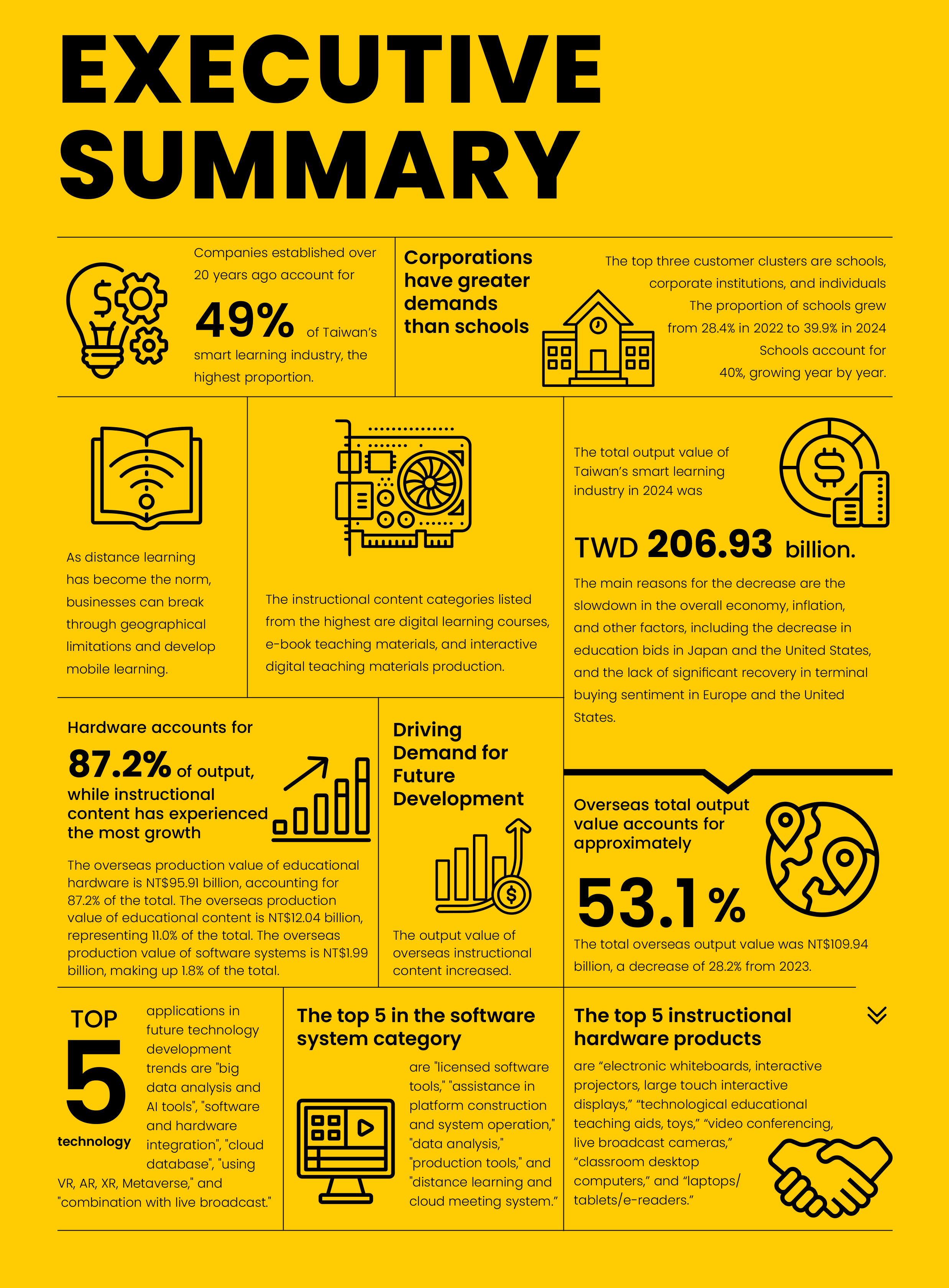

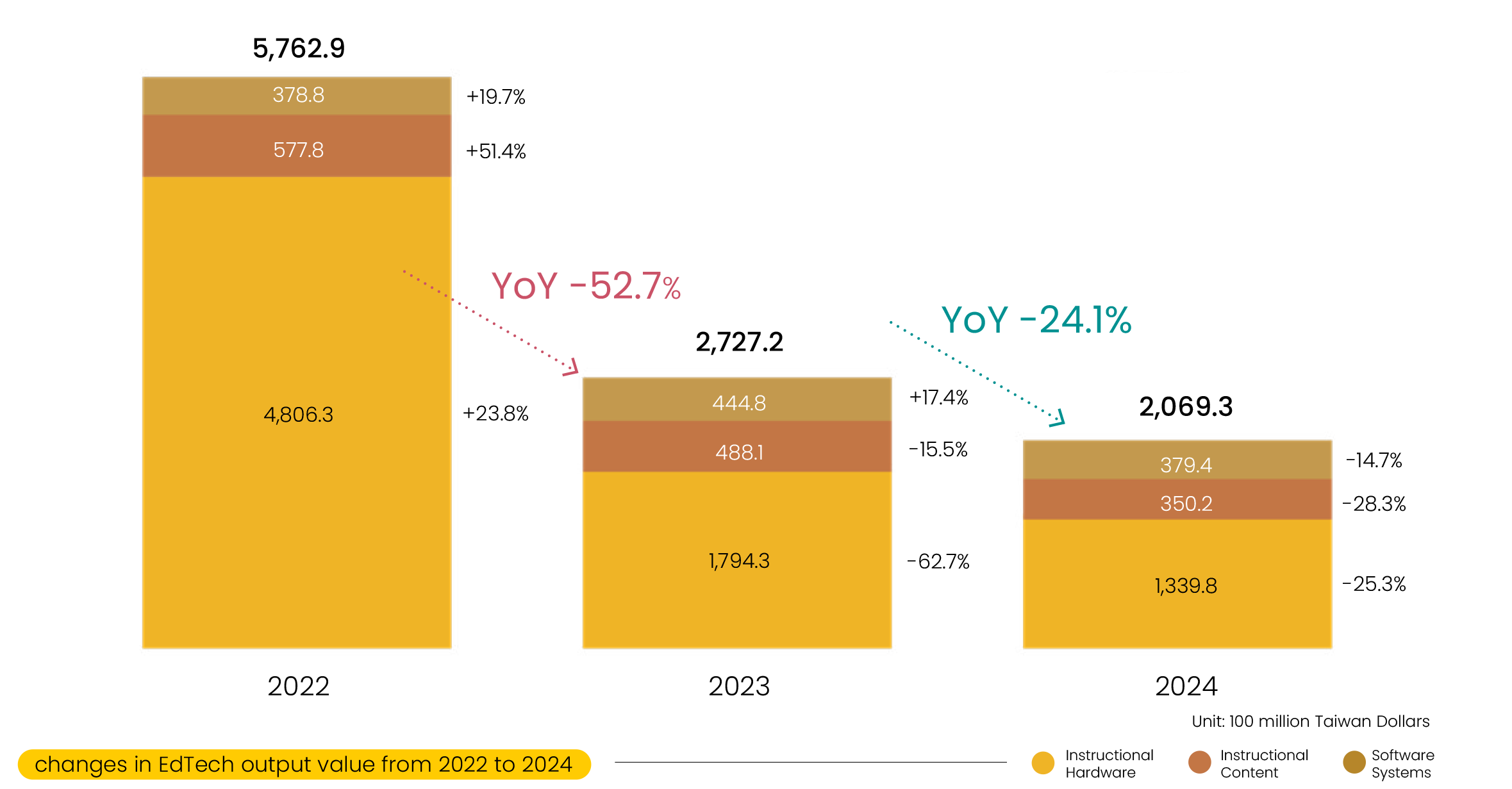

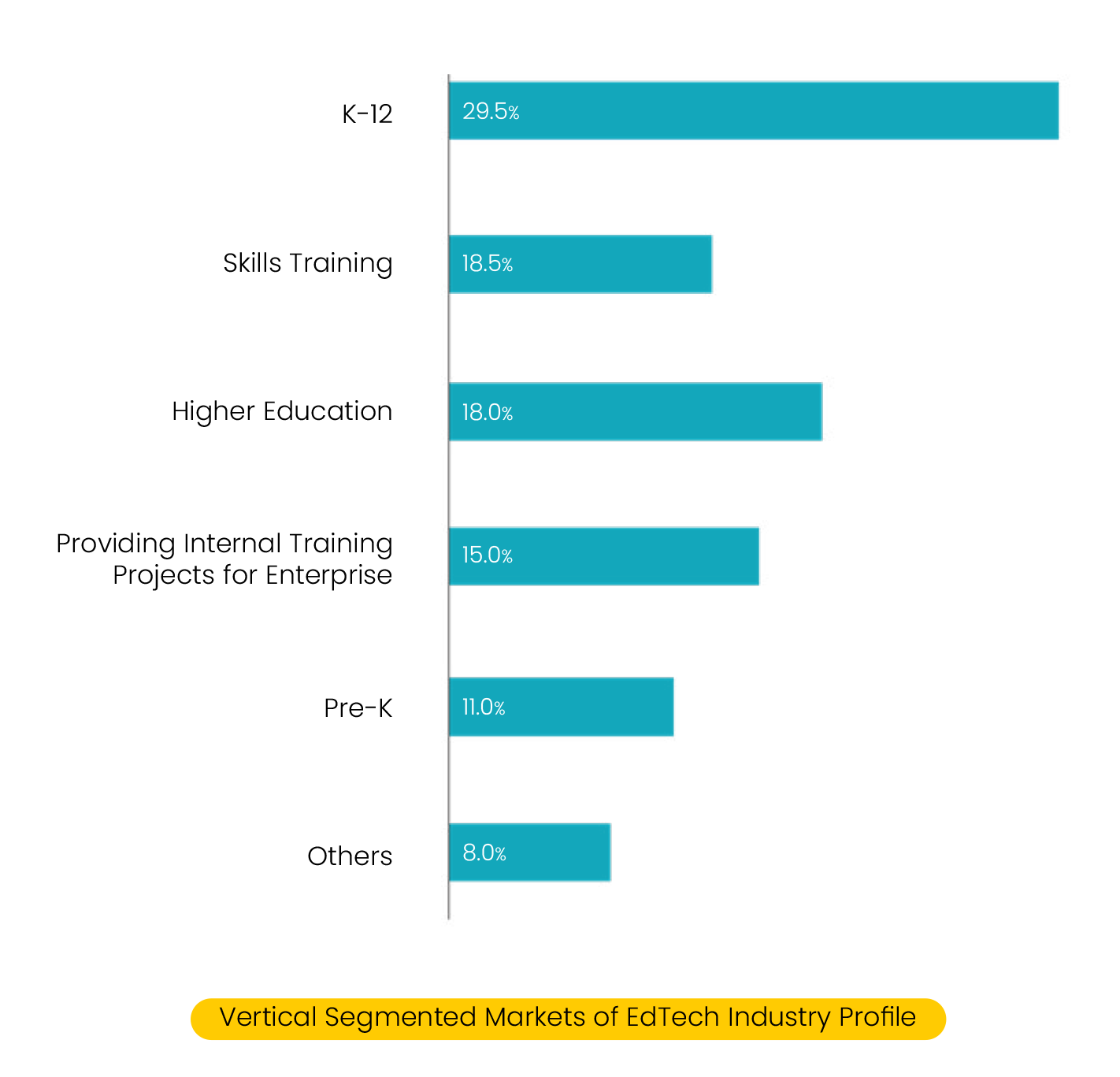

According to this survey, the primary vertical markets for Taiwan’s EdTech business in 2024 are “K-12 “(29.5%), “skills training” (18.5%), “higher education” (18%), “Providing Internal Training Projects for Enterprise ” (15%), and “Pre-K”(11%). It can be seen that companies primarily focus on K-12 education, skills training, and higher education as their main target groups. Compared with 2023, the proportion of” Pre-K” increased by 5.6%, and the proportion of “Providing Internal Training Projects for Enterprise” increased by 3.3%. On the other hand, the proportion of “K-12 education” fell by 12.0%.
*In 2023, the top three were K-12 education (41.5%), higher education (18.5%), and skill training (16.6%).
*In 2023, the top three were K-12 education (41.5%), higher education (18.5%), and skill training (16.6%).


According to the 2024 survey, the customer categories and percentages of the annual revenue in Taiwan’s EdTech industry are as follows: “Schools” (39.9%), “Enterprises” (29.1%), “Individuals” (16.6%), “Government” (8.9%) and “Training/Cram Schools” (5.5%).
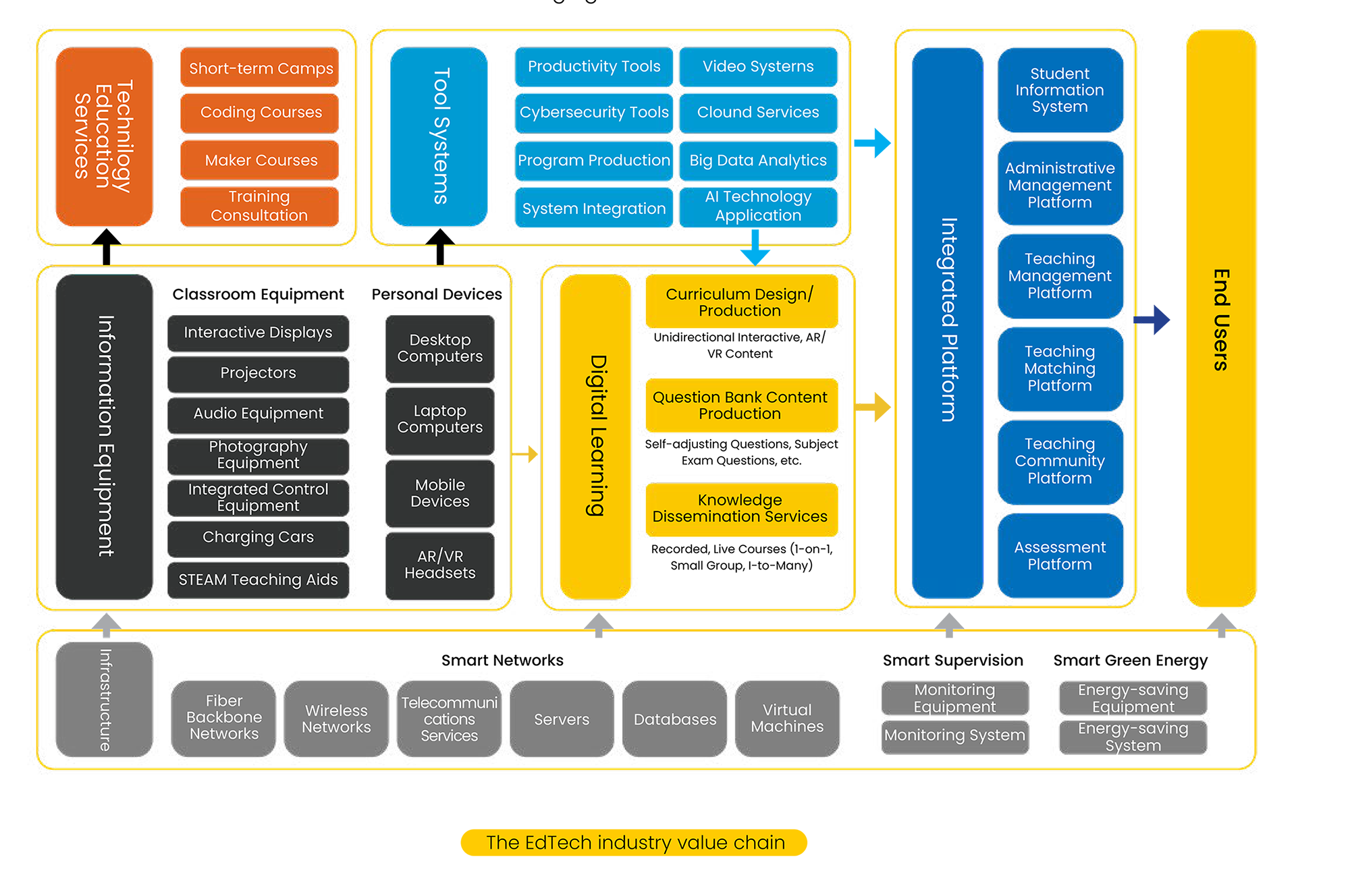

Instructional Content |
Digital Learning Digital learning includes the design of teaching materials and digital knowledge transfer services. The design of teaching materials refers to the development of digital teaching materials and courses for users to access on various devices such as desktop computers, laptops, smartphones, and tablets. Digital knowledge transfer services provide various subject teaching and training services through online on-demand or live broadcasting, allowing users to learn anytime, anywhere, on multiple devices. Instructional content can be divided into teaching content for subjects such as English, Mandarin, IT, management, industry, gaming, healthcare, textbooks, and corporate training courses, as well as for different age groups such as preschool, K-12 education, higher education, vocational education, and lifelong learning. Instructional content can also be classified according to product types, such as e-books, MOOCs, instructional videos, AR/VR games or videos, online live teaching, online tutoring services, and more. Technology Education Services With the evolution of smart education and the global STEAM education trend, the scope of smart education has expanded beyond online learning services to include offline STEAM-related technology education and training services. The technology education services referred to in this study scope provide physical technology education and related teaching and training services for children or adults, including science summer camps, programming language courses, and Maker courses, among others. |
Software Systems |
Integrated Platforms Integrated platforms provide a single, comprehensive resource system for learners, teachers, and educational institutions to use for teaching. This includes learning management systems (LMS, LCMS), instructional live broadcasting platforms, instructional matching platforms, instructional community platforms, and platforms that provide administrative management services for education, such as campus administrative systems, library management systems, payroll management systems, official document management systems, campus health management systems, parent-teacher-student platforms, among others. Tool Systems Tool systems provide various digital solutions, licensed software, and technical solutions for digitizing instructional content without directly engaging with end-use learners. These include production tools, platform construction systems, application development systems, big data analysis, video collaboration software, and more. |
Instructional Hardware |
Information Equipment This category includes various technological information equipment in the learning space, such as front projection systems, rear projection systems, virtual electronic whiteboards, interactive teaching televisions, electronic book bags, document cameras, e-book readers, learning devices, optical recognition pens, learning laptops, learning game consoles, learning tool simulators, as well as wired and wireless network equipment, system servers, and terminal hardware that provides access to systems (personal computers, smartphones, etc.). It also includes innovative technology education materials such as STEAM course toys and teaching aids, and integrated solutions. Basic Equipment Basic equipment refers to the supporting systems or hardware devices associated with the core products and services in the smart education field. Building a high-quality digital infrastructure provides a better application environment for smart learning products and services and helps construct a complete smart campus solution. It can be divided into three subcategories: smart networking, smart monitoring, and smart green energy. |
Instructional Content |
| Digital Learning Digital learning includes the design of teaching materials and digital knowledge transfer services. The design of teaching materials refers to the development of digital teaching materials and courses for users to access on various devices such as desktop computers, laptops, smartphones, and tablets. Digital knowledge transfer services provide various subject teaching and training services through online on-demand or live broadcasting, allowing users to learn anytime, anywhere, on multiple devices. Instructional content can be divided into teaching content for subjects such as English, Mandarin, IT, management, industry, gaming, healthcare, textbooks, and corporate training courses, as well as for different age groups such as preschool, K-12 education, higher education, vocational education, and lifelong learning. Instructional content can also be classified according to product types, such as e-books, MOOCs, instructional videos, AR/VR games or videos, online live teaching, online tutoring services, and more. Technology Education Services With the evolution of smart education and the global STEAM education trend, the scope of smart education has expanded beyond online learning services to include offline STEAM-related technology education and training services. The technology education services referred to in this study scope provide physical technology education and related teaching and training services for children and adults, including science summer camps, programming courses, and Maker courses, among others. |
Software Systems |
| Integrated Platforms Integrated platforms provide a single, comprehensive resource system for learners, teachers, and educational institutions to use for teaching. This includes learning management systems (LMS, LCMS), instructional live broadcasting platforms, instructional matching platforms, instructional community platforms, and platforms that provide administrative management services for education, such as campus administrative systems, library management systems, payroll management systems, official document management systems, campus health management systems, parent-teacher-student platforms, among others. Tool Systems Tool systems provide various digital solutions, licensed software, and technical solutions for digitizing instructional content without directly engaging with end-use learners. These include production tools, platform construction systems, application development systems, big data analysis, video collaboration software, and more. |
Instructional Hardware |
| Information Equipment This category includes various technological information equipment in the learning space, such as front projection systems, rear projection systems, virtual electronic whiteboards, interactive teaching televisions, electronic book bags, document cameras, e-book readers, learning devices, optical recognition pens, learning laptops, learning game consoles, learning tool simulators, as well as wired and wireless network equipment, system servers, and terminal hardware that provides access to systems (personal computers, smartphones, etc.). It also includes innovative technology education materials such as STEAM course toys and teaching aids, and integrated solutions. Basic Equipment Basic equipment refers to the supporting systems or hardware devices associated with the core products and services in the smart education field. Building a high-quality digital infrastructure provides a better application environment for smart learning products and services and helps construct a complete smart campus solution. It can be divided into three subcategories: smart networking, smart monitoring, and smart green energy. |


